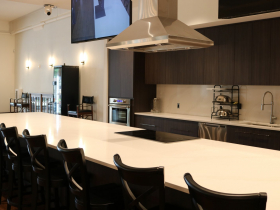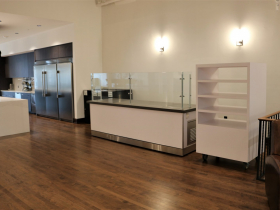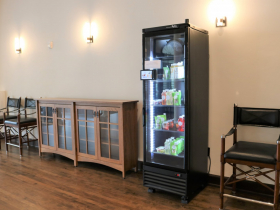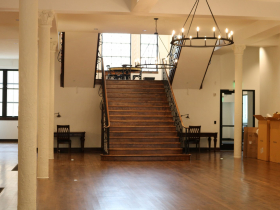Inside Dohmen Company’s King Dr. Facility
Renovated building is new home for health care company and foundation, including food programs and kitchens.

Site of Dohmen Company Foundation headquarters in Bronzeville. Photo taken Sept. 12, 2022 by Sophie Bolich.
The Dohmen Company Foundation’s transition to its new Bronzeville headquarters is nearly complete. Come October, the company will invite the public to view the new facilities, comprising two buildings that will house administrative offices, community programming space and commercial kitchens for the company.
The Milwaukee-based company has offices in the Historic Third Ward and a food-preparation facility in Chicago, both of which will begin to wind down in the coming months.
Formerly in the pharmaceutical business, the 160-year-old company transitioned to a preventative approach to healthcare in 2019. The company’s business model shifted along with its philosophy. Under the Philanthropic Enterprise Act of 2018, Dohmen transitioned from a for-profit corporation to a philanthropic enterprise after selling off its life science services division, Urban Milwaukee previously reported. The charitable foundation is now the sole owner of the Dohmen Company and its for-profit subsidiaries, with 100% of profit funneled to charity, assuring a self-sustaining cycle.
The model ensures that low-income and marginalized populations have equitable access to programming like Dohmen’s Cooked and Food for Health programs.
“We’re really focused on health equity and creating equitable access to healthy and happy lives,” Koshgarian said.
Dohmen completed a historically-sensitive renovation, restoring the building’s original wood floors and plaster pillars and uncovering its storefront windows.
The subscription-based Food for Health program takes a three-pronged approach to preventing and treating chronic illnesses like diabetes, heart disease and cancer — inviting participants to “be fueled, be fit and be focused,” Koshgarian said.
A commercial kitchen is one new addition to the space. A vast, white marble counter offers 12 front-row seats for participants to observe cooking methods, knife skills and other culinary techniques. The kitchen is outfitted with audio-visual equipment and monitors to accommodate additional seating. Dohmen is in the process of expanding its offerings to include classes in Spanish and other languages, according to Koshgarian.
Across the room is a fitness center for low-impact aerobic, stretching and weight-training classes. Classes are capped at 25 in-person participants, but can be livestreamed for additional virtual access.
The street-facing side of the building has large, floor-to-ceiling windows that allow passersby a glimpse into the facility. Koshgarian said the front portion of the building may eventually become a retail space or grab-and-go cafe. For now, the area contains a pool table and a seating area with couches.
Dohmen’s offices are located on the building’s second floor, which is elevator-accessible and also contains a kitchen and a small library. Coworking and gathering are important aspects of the company culture, said Koshgarian, as she noted various gathering areas throughout the office space. A skylight added during construction runs down the center of the room, bringing natural light to the network of cubicles.
Employees are not excluded from the company’s health-focused mission. A first-floor vending machine offers fresh fruit, hummus and crudite and local options like fresh-pressed beverages from Juiced! The building will also have an in-house chef for its lunch program, which allows employees to order a custom meal through an app for pickup.
There is no shortage of seating options on each level of the building, but a round table on the mid-level landing offers the best view — both of the King Drive building’s interior and, through its three, arched windows, of the company’s other structure at 334 W. Brown St.
The windows on the landing are leaded glass. Dohmen repaired 60% of the original glass and removed metal bars from the exterior of the windows, adding double-hung glass panels to let more light through.
“When the light comes in at just the right time of the day, it’s absolutely gorgeous,” Koshgarian said.
Dohmen demolished the existing building and is now in the process of constructing a new, 15,000-square-foot structure to house its commercial kitchens. The kitchens will be USDA-certified, according to Koshgarian, and are expected to be ready for occupancy by Nov. 1.
At full capacity, the kitchens will produce up to 50,000 meals weekly for the company’s Cooked program. The first of its kind in Wisconsin, the program creates and distributes 10, medically-tailored meals per week to participants. The company will employ James Beard chefs to develop meals that are plant-based and low in sugar, sodium, dairy and saturated fat, Koshgarian said.
“Each of our dishes goes through a stringent research and development process, and the standard that we hold ourselves to is five-star, Michelin-rated qualifications,” she said. “Each one of our meals is delivered at the same level of quality, standard deliciousness and experience.”
Food for Health and Cooked programming is expected to begin later this year. Koshgarian said programs will be continually adjusted based on community feedback.
The health-centric company was founded in 1858 in the Historic Third Ward. It will continue to operate there until December. As operations at the Chicago facilities come to an end, the company will bring upwards of 25 jobs to Milwaukee with the intent of drawing local applicants.
The company will host an open-house tour of the two buildings Oct. 27. More information about the open house will be released at a later date.
Photos
If you think stories like this are important, become a member of Urban Milwaukee and help support real, independent journalism. Plus you get some cool added benefits.



























